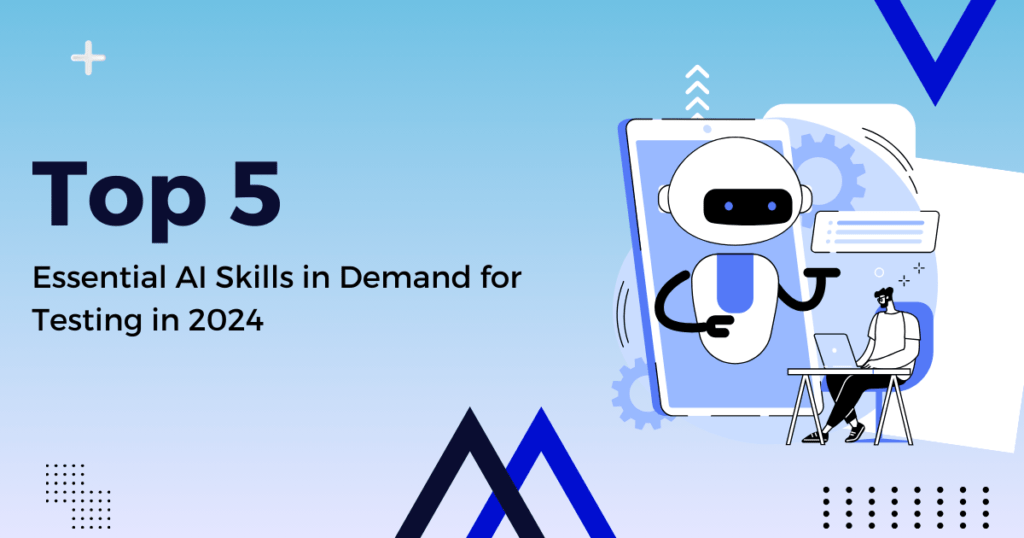AI is playing a more and more important role in software testing. It transforms traditional testing methods and improves efficiency, accuracy and reliability. In the years to come, testing professionals will be in high demand for certain AI skills.
Here are the 5 most important AI skills that you need to master in order to keep up with the fast-changing tech landscape.
1. Machine Learning Algorithms
Machine learning (ML), at its core, is the foundation of AI-driven tests. Understanding and implementing ML algorithms will improve test automation, predictive analysis and other aspects of AI-driven testing.
- Supervised learning: Learn to train models with labelled data in order to predict outcomes. This is essential for developing test scenarios that are predictive.
- Unsupervised Learning: Understanding clustering and association algorithms to identify patterns and anomalies without prior labels.
- Reinforcement learning: Familiarise yourself with algorithms that can learn from their environment and make decisions in order to maximise cumulative rewards. This is useful for optimising test strategies, as well as identifying the optimal test paths.
2. Natural Language Processing (NLP).
NLP is essential to analyze and process human language. This will enable more intelligent and user friendly test interactions.
- Text Analysis: Learn how to extract text, analyze sentiment, and recognize entities in order to efficiently analyze user feedback and requirements.
- Chatbots and Virtual assistants: Learn to integrate chatbots into automated customer service and query resolution for testing.
- Test Case Generating: Use NLP to generate test cases automatically from user stories and requirements. This will improve test coverage and accuracy.
3. Data Science and Analytics
For handling and analyzing huge volumes of test data, it is essential to have skills in data science. This will allow you to gain meaningful insights and improve your testing processes.
- Data Preprocessing: Learn how to clean and prepare test data. This includes handling missing values, normalizing data and engineering features.
- Statistical Analysis: Use statistics to identify trends, correlates and outliers within test data. This will help predict issues and optimize testing efforts.
- Visualization: Learn how to use data visualization tools such as Tableau and Matplotlib in order to create dashboards and reports with insightful information that can help you make informed decisions.
4. AI-Driven Test Automation
AI-driven automation of test frameworks uses AI to make them more adaptive.
- Automated Test-Script Generation: Discover how AI can generate and update automated test scripts automatically based on changes in code and user interaction.
- Intelligent Test Execution (ITE): Learn how to prioritize test cases and execute them based on impact and risk analysis.
- Continuous Testing: Integrate AI driven testing into CI/CD to enable continuous testing. Provide real-time feedback about code quality.
5. Robotic Process Automation
RPA skills can be used to automate repetitive tasks and free up testers so they can focus on complex scenarios.
- Bot Development: Create and deploy bots that automate tasks like data entry, testing setup, and environment configuring.
- Process Optimization: RPA can be used to optimize and streamline testing workflows. This will improve efficiency and reduce manual errors.
- Integrating AI: Learn how to integrate RPA and AI to make automation bots more intelligent, adaptable, and adaptive.
Ready to enhance your software quality and accelerate your time to market? Contact us today at sales@stelotechnology.com to request a customized quote for your business!
The conclusion of the article is:
As AI continues to be in high demand, updating your skills will improve both your career and testing abilities. You can be well-equipped for the challenges of software testing by mastering machine-learning algorithms, data science and AI-driven test-automation.
Adopt these AI skills to transform your approach in quality assurance and position yourself at the forefront of the testing industry by 2024.


